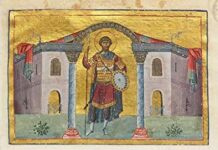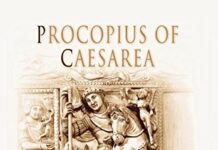
Ebook Info
- Published: 2008
- Number of pages: 482 pages
- Format: PDF
- File Size: 3.22 MB
- Authors: Anthony Kaldellis
Description
This text was the first systematic study of what it meant to be ‘Greek’ in late antiquity and Byzantium, an identity that could alternatively become national, religious, philosophical, or cultural. Through close readings of the sources, Professor Kaldellis surveys the space that Hellenism occupied in each period; the broader debates in which it was caught up; and the historical causes of its successive transformations. The first section (100–400) shows how Romanisation and Christianisation led to the abandonment of Hellenism as a national label and its restriction to a negative religious sense and a positive, albeit rarefied, cultural one. The second (1000–1300) shows how Hellenism was revived in Byzantium and contributed to the evolution of its culture. The discussion looks closely at the reception of the classical tradition, which was the reason why Hellenism was always desirable and dangerous in Christian society, and presents a new model for understanding Byzantine civilisation.
User’s Reviews
Editorial Reviews: Review “Kaldellis is one of the most brilliant young Byzantinists in the US academic world today. …This wide-ranging book of impressive scholarship deserves a place in every university library. Highly recommended.” –Choice Book Description This text examines what it meant to be ‘Greek’ in late antiquity and Byzantium.
Reviews from Amazon users which were colected at the time this book was published on the website:
⭐That book is unique among all the monographs about Byzantium that it is dedicated to Byzantium’s relationship with Classical, “Hellenic” ideas, and mentions the Church only in this context. While there’s no doubt that Byzantium was an Orthodox Christian society first and foremost, Christianity was not the only component of the rich society of the Rhomaioi. Therefore, exploring its other avenues is only fair to it.In general, “Hellenism in Byzantium” is a valuable and an interesting book. Starting from Antiquity and going to the 13th century, this book, in readable and involving style, narrates the story of Hellenism and Hellenic identity in Byzantium – or, to be more exact, Rhomania – for Kaldellis argues that the Byzantines saw themselves as Romans first and foremost, and only in 12th century Hellenism as a national identity slowly started to take root, receiving a boost from the complications of post – Fourth Crusade Byzantine world. He points out that the use of the term “Hellene” and “Hellenism” for the majority of Byzantine history varied, but it wasn’t ethnical as much as cultural or religious.Far more interesting then all that, however, is Kaldellis’ narration of Hellenic culture in Byzantium. Unlike the authors who dismiss the antique-style romances of 12th century and other homages to Hellenism like the satirical dialogue “Timarion”, which narrates an afterlife similar to the Greek legends and not at all similar to its Christian conceptions as a fossilised, formal genre, which is only worthy of brief mentions, Kaldellis successfully argues that you can’t dismiss literary works by saying that they’re a part of a genre – rather, you should explain why that genre is demanded and produced by society. He analyses “Timarion” and a romance by Theodoros Prodromos, a 12th century author, in great detail.However, there’re some relatively small problems with the book. In the first part, about pre-12th century Byzantium, I occasionally wanted some more direct quotation from sources – for example, I’d like to know the words of that “From Leon the Philosopher, the so-called Hellene to Himself” epigram.Also, he occasionally reaches a bit too far. I’m not convinced that Byzantium was a Roman national state, despite his insistence on so. More likely, the ideology of Byzantium had both national and oecumenic strains. He, in my option, is a bit too willing to dismiss the sources that don’t confirm to his view of Byzantium as exceptions.And, while he, in general, is an objective researcher, occasionally he displays a slight hostility to Christianity that isn’t really needed. I’m not convinced that Julian the Apostate deserves to be written about with such a clear sympathy.But these are minor quabbles. Perhaps, the largest problem with Kaldellis’ work is the fact that it cuts off in the 13th century. He doesn’t analyze the intellectuals of the Palaiologoi Byzantium – Nikephoros Gregoras and Ioannes VI are not mentioned in his work, and Plethon with Chalkokondyles are mentioned only once or twice. People wishing to receive information about them need to read the (good) work of Gill Page, “Being Byzantine”.Overall, this is a remarkably fresh and stimulating book, that is different from other Byzantine studies.
⭐While the overt topic of “Hellenism in Byzantium” is the relationship of Christian Byzantine culture to its Greek past and to the Hellenic content of its education, Professor Kaldellis’ treatment contains along the way a REVOLUTION in Byzantine Studies. This happens because of the manner in which Kaldellis takes seriously the ROMAN identity of the Mediaeval “Byzantines.” Thus, I don’t believe that the expression “Byzantine Empire” ever appears in the book. Instead, we get the proper name of the Roman Empire, which had been used since the 4th century in both Latin and Greek, but which is generally ignored in most histories of Rome or Byzantium: namely “ROMANIA.”The Roman identity of the Empire ruled from Constantinople is explicitly or implicitly rejected by (1) the Mediaeval Latin West, which wanted its own Frankish and German (often illiterate) Emperors, and the Popes, to be the “true” Romans, (2) Modern Greeks, who want the Mediaeval Greeks to be, well, GREEKS, in the full nationalistic sense, and (3) modern Byzantinists, who continue the Latin narrative, either from a Classicist conviction that “true” Romans were ancient, Latin, Western, pagan, and extinct, or from an attitude, exemplified by Edward Gibbon, that Mediaeval Romania was corrupt, decadent, degenerate, weak, and superstitious, i.e. Christian.The great historian of Late Antiquity, Peter Brown, has already said that the name “Byzantine Empire” is “a modern misnomer redolent of ill-informed contempt.” Now Kaldellis has fully exposed the combination of preconception, bias, hostility, and bigotry that has denied to the State of Justinian, the Iconoclasts, the Comneni, and the Palaeologi its identity as the obvious and self-consciously institutional, religious, cultural, and political continuation of ancient Rome.
⭐Don’t waste your time.
⭐Be aware: the paperback edition is a cheap and carelessly made print-on-demand copy in bad copy-shop quality. Particularly annoying: the book block was apparently not cut with a cutting machine: the spine has both on top and at the bottom skewed edges – it looks as if some drunkard would have chopped off all the edges of the book with a hatchet. Definitely not worth the $55 I paid for this item.
⭐The “5th century fall of Rome” is one of the greatest urban legends of western popular culture. Like all urban legends it is simply not true. It was the Western Roman Empire that fell during the 5th century. By that time, however, the center of Roman power had already shifted to the East, following Constantine’s “translatio Urbis” and the foundation of Nova Roma (Constantinople). These “unfallen Romans of the East” are the people that we commonly misname “Byzantines”. Most of them were Greek-speaking, Christians, but Romans nevertheless.In this book, Anthony Kaldellis explains how, by the processes of romanization and christianization, the pagan Hellenes who were conquered by the ancient Romans, eventually became Christian Romans.Once he explains how these greek-speaking, Christian Romans of the East were formed, he then narrates the various ways by which these “Byzantines” engaged with “Hellenism” (pagan Greek culture). On one hand, “Hellenism” in a religious sense was the polar opposite of Christianity and, hence, was something loathsome and dangerous. On the other hand, “Hellenism” as highbrow culture was a desirable marker that separated the educated elite from the uneducated masses.Kaldellis basically explains how the Byzantines engaged with these two sides of Hellenism. He makes some very refreshing new arguments and, in the meantime, he exposes some long-held, never proven beliefs about Byzantine identity that have been uncritically reproduced during the last 100 years of Byzantine studies.I highly recommend this book to everyone interested in undestanding the dynamic evolution of Byzantine identity during the period ~500-1250 AD.
⭐very good
Keywords
Free Download Hellenism in Byzantium: The Transformations of Greek Identity and the Reception of the Classical Tradition (Greek Culture in the Roman World) 1st Edition in PDF format
Hellenism in Byzantium: The Transformations of Greek Identity and the Reception of the Classical Tradition (Greek Culture in the Roman World) 1st Edition PDF Free Download
Download Hellenism in Byzantium: The Transformations of Greek Identity and the Reception of the Classical Tradition (Greek Culture in the Roman World) 1st Edition 2008 PDF Free
Hellenism in Byzantium: The Transformations of Greek Identity and the Reception of the Classical Tradition (Greek Culture in the Roman World) 1st Edition 2008 PDF Free Download
Download Hellenism in Byzantium: The Transformations of Greek Identity and the Reception of the Classical Tradition (Greek Culture in the Roman World) 1st Edition PDF
Free Download Ebook Hellenism in Byzantium: The Transformations of Greek Identity and the Reception of the Classical Tradition (Greek Culture in the Roman World) 1st Edition





